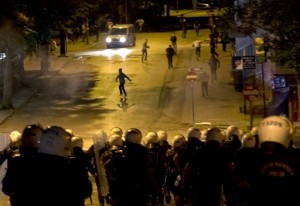Turkey police retake Istanbul square from protesters

Turkish riot police charge toward protesters during clashes in Ankara, Turkey, Tuesday, June 11, 2013. Turkey’s Prime Minister Recep Tayyip Erdogan will meet with a group of protesters occupying Istanbul’s central Taksim Square this week, Deputy Prime minister Bulent Arinc said Monday, as the government sought a way out of the impasse that has led to hundreds of protests in dozens of cities. (AP Photo/Vadim Ghirda)
ISTANBUL — Hundreds of police in riot gear forced through barricades in Istanbul’s central Taksim Square early Tuesday, pushing many of the protesters who had occupied the square for more than a week into a nearby park.
Police briefly fired tear gas canisters and rubber bullets prompting many of the protesters to flee the square into Gezi Park, where many had been camping.
But some groups clashed with police at one edge of the square, firing fireworks, firebombs and stones at police water cannon. Police made frequent announcements through loudspeakers, asking the group to stop attacking police, before firing tear gas.
Earlier, demonstrators had manned the barricades and prepared for a possible intervention when officers began massing in the area.
Police took down large banners that had been hung by protesters on a building on the edge of the square. They replaced them with a large Turkish flag and a banner with a picture of Mustafa Kemal Ataturk, the beloved founder of the secular republic 89 years ago after the collapse of the Ottoman Empire.
Huseyin Avni Mutlu, the governor for Istanbul, said in a message issued on his Twitter account that the police operation was to dismount the banners hung on the building and at a monument on the square. He said people occupying the park at the square would not be touched.
Turkey’s most widespread anti-government protests in decades erupted on May 31 after a violent police crackdown on a peaceful sit-in by protesters objecting to a project replacing the park with a replica Ottoman-era barracks.
As police clashed with some activists, bulldozers and garbage trucks began cleaning up some of the barricades on the square. A group of protesters were seen at another corner of the square, apparently trying to negotiate with police.
A statement from Mutlu’s office said the banners of various groups taking part in the protests were making the square look as though it was under “occupation” and was “negatively affecting our country’s image in the eyes of the world opinion and leading to reaction from within the society.”
Before the police action, the protests appeared to be diminishing with the smallest number of demonstrators in the past 12 days gathering in Taksim on Monday night. The protesters occupying Gezi Park had remained, however.
Smaller protests occurred in Ankara too, with about 5,000 people demonstrating. Police there have used water cannon and tear gas to break up demonstrations almost every night.
Three people have died and more than 5,000 have been treated for injuries or the effects of gas during the protests. The government says 600 police officers have also been injured.
Prime Minister Recep Tayyip Erdogan had said he would meet with the Gezi Park protesters on Wednesday, following a request by some of the protesters.
The nationwide unrest first erupted after police cracked down heavily on a campaign to save Istanbul’s Gezi Park, next to Taksim Square, from demolition on May 31.
The trouble spiraled into mass displays of anger against Erdogan and his ruling Justice and Development Party (AKP), seen as increasingly authoritarian.
Nearly 5,000 demonstrators, scores of whom are young and middle-class, have been injured and three people have died, tarnishing Turkey’s image as a model of Islamic democracy.
“Our intention is to remove the signs and banners at the site. We have no other goal,” said Istanbul governor Huseyin Avni Mutlu on Twitter.
“We will not touch Gezi Park and Taksim, we will absolutely not touch you,” he added, urging demonstrators to stay away from troublemakers.
Burak Arat, 24, said he was sleeping in Gezi Park when police moved in on the square, seen as a “liberated” zone until now. “We will fight. We want freedom. We are freedom fighters,” the tourism student told AFP as he made his way to the square where bursts of tear gas were ringing out.
Turkey’s combative leader has so far responded with defiance to the protesters. On Sunday, he inflamed tensions by staging his own rallies, firing up AKP supporters with combative rhetoric.
“Those who do not respect this nation’s party in power will pay a price,” he told thousands of cheering party faithful in Ankara, as just a few kilometers (miles) away riot police doused thousands with tear gas and water.
Opponents accuse Erdogan of repressing critics — including journalists, minority Kurds and the military — and of pushing conservative Islamic values on the mainly Muslim but staunchly secular nation.
But the 59-year-old is also considered the most influential leader since Mustafa Kemal Ataturk, the father of modern Turkey, and remains the country’s favorite politician.
His AKP has won three elections in a row and took nearly half the vote in the 2011 elections, having presided over strong economic growth.














